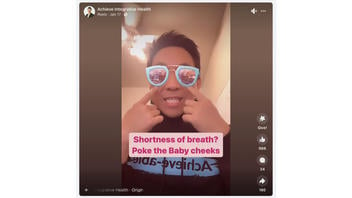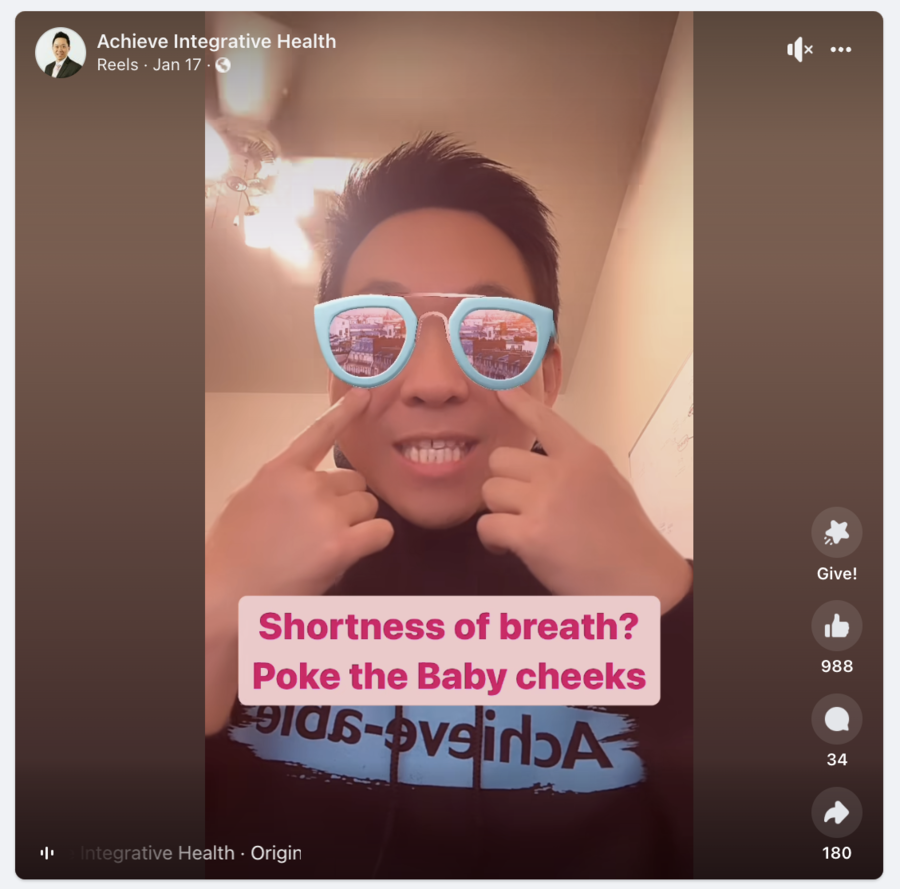STORY UPDATED: check for updates below.

Does massaging the cheeks provide relief for shortness of breath? No, that's not true: Physiology and massage experts told Lead Stories that there's no connection between the two things. Shortness of breath is typically related to respiratory or cardiovascular issues, and massaging would not address the underlying causes of the symptom.
The claim appeared in a video (archived here) posted on Facebook by Achieve Integrative Health on January 17, 2024. A text graphic on the video says:
Shortness of breath?
Poke the Baby cheeks
This is what the post looked like on Facebook at the time of writing:
(Source: Facebook screenshot taken on Fri Jan 19 17:24:14 2024 UTC)
The video
In the minute-long clip, Jimmy Yen, the CEO of Achieve Integrative Health, an acupuncture clinic in Cedar Park, Texas, makes his pitch that massaging your face, just under your cheek bones on the front of your face, relieves shortness of breath. Here's what he says:
Shortness of breath? You want to do the baby cheeks. You know when you see a little baby and ... you're like, all these babies they have like these big cheeks. And what do you want to do with those cheeks? You want to push on them, right? You want to push on 'em because there's so squishy, right?
So, when you have shortness of breath, sometimes you got respiratory issues, right? So, it was like you can't inflate your lungs enough. You can't take enough deep breath. You're like shallow breathing. You can't really take a deep breath, right?
Well, here's the cheeks, the baby cheeks area. This area corresponds to your lungs. So, what you want to do is you want to push on your own baby cheeks. So ... push on your baby cheeks and just massage it around. And as you massage it, take deep breaths, OK? In through your nose and out through your mouth, all right? In through your nose and just keep doing this for 30 seconds as much as you want.
Make sure you hit the Follow button because you know ...
Yen's online bio says he has a master's degree in Oriental medicine and a bachelor's in biochemistry. He is not a doctor of medicine (MD).
Experts
Ronald Abercrombie is a professor emeritus of the Department of Physiology at the Emory University School of Medicine in Atlanta. Physiology examines how the human body and body parts function.
In a January 19, 2024, email to Lead Stories, Abercrombie said there's no direct physiological connection between your cheeks and your lungs:
There are many physiological causes for shortness of breath. Any advice about this condition without having someone consult their physician would be dangerous and unethical.
However, that said, the only way that massaging one's cheeks might alleviate shortness of breath that I can think of would be in relieving anxiety. Anxiety could cause shortness of breath, but this is a relatively minor cause for the condition and there would be no certainty that massaging your cheeks would alleviate this... much less provide a cure.
One massage-therapy expert agreed.
Debra Persinger is the executive director of the Federation Of State Massage Therapy Boards, which describes its mission as to "ensure that the practice of massage therapy is provided to the public safely and competently." In her January 19, 2024, email to Lead Stories, Persinger said the claim in Yen's video on Facebook is "absurd and has no basis in fact." She continued:
Massaging (face or buttock) cheeks does not cure shortness of breath.
In a follow-up email, Persinger added:
Massage does not 'cure' anything and claims to the contrary would be out of the legal scope of practice. Cheeks are unrelated to lung function.
National Library of Medicine
Lead Stories searched the National Library of Medicine, which indexes more than a million titles, and found no published peer-reviewed study (archived here) proving that massaging a person's cheeks cures shortness of breath (dyspnea), nor did we identify any known physiological mechanism that would explain or allow for such a specific sequence of events.
Yen's response
Lead Stories requested a response from Yen on January 19, 2024, but did not receive one until three days later, after the original version of the story was published. In his email to Lead Stories on January 22, 2024, he said he's "not promoting a treatment" in his video. Yen continued:
I'm explaining an acupressure technique that is based on traditional Chinese medicine (a 3,000 year old medicine). There are meridians that are connected from the cheek area to the chest area. Stimulating the nerves along these meridians increases blood circulation to the chest area, which for some people allow them to breathe more easily. ...
In my clinic patients see improved ability to take a deep breath, respiration becomes easier, and improvement in their ADLs [activities of daily living] as a result of better breathing. The public can use a spirometer before they apply the technique and afterwards to see if their lung capacity increased or not.
Asked for data supporting his claims of "better breathing," Yen provided, none, saying instead, "My patients are my proof."
In a second email response on January 22, Yen added, "my acupressure technique is NOT a medical treatment." He continued:
It's a wellness technique based on Traditional Chinese Medicine to help people improve their quality of life.
Read more
Additional Lead Stories fact checks of claims related to the healing powers of massage can be found here.
Updates:
-
2024-01-22T19:35:14Z 2024-01-22T19:35:14Z Adds response from Jimmy Yen, the CEO of Achieve Integrative Health, and the originator of the video.


















